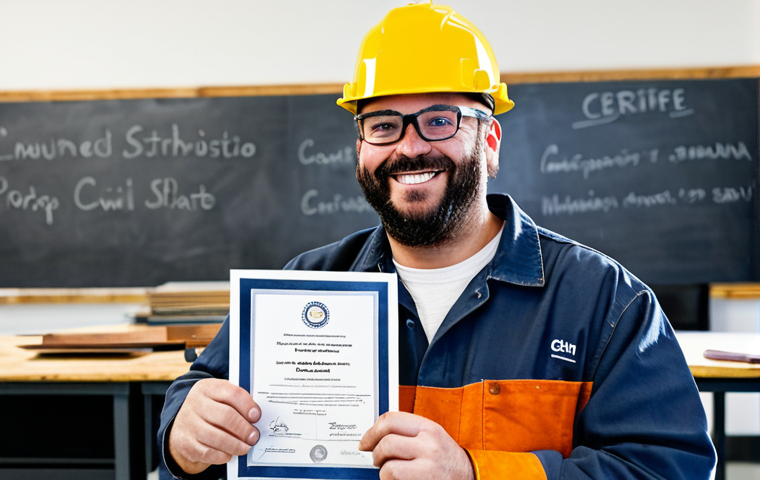Diving into the world of metal material certifications, it’s easy to wonder how much of a difference that piece of paper really makes to your paycheck.
I’ve seen firsthand how specific certifications can open doors to specialized roles and higher-paying positions in manufacturing and engineering. The initial salary might not seem drastically different, but the long-term career trajectory and earning potential often see a significant boost.
Think about it: better job security, chances for promotions, and opportunities to negotiate a higher salary. We’ll explore the impact of these certifications on salary expectations.
Let’s dig deeper and get this figured out.
Alright, let’s dive into this!
Certifications: The Golden Ticket to Bigger Paychecks?

In my experience, certifications are like the secret handshake in the metal industry. It’s not just about having the knowledge; it’s about proving you have it through a recognized standard.
Think of it as leveling up your character in a video game – each certification boosts your stats, making you more attractive to employers and giving you leverage when negotiating your salary.
I’ve seen colleagues with AWS certifications effortlessly command higher rates because they brought a validated skill set to the table. It’s the same principle here.
Beyond the Basic Pay Scale
Let’s be real, nobody jumps from minimum wage to six figures overnight just because they passed a test. The real magic happens when you combine certifications with real-world experience.
It’s about showcasing how you’ve applied that knowledge to solve problems, improve processes, and ultimately, save the company money. That’s when the salary negotiations start getting interesting.
I recall one instance where a newly certified welder was able to justify a significant raise by demonstrating how their improved techniques reduced material waste and increased production efficiency.
The Company’s Perspective
From a management standpoint, hiring certified professionals minimizes risk. It’s an investment in quality and reliability. Certifications provide a standardized measure of competence, assuring employers that the individual possesses the necessary skills and knowledge to perform their job effectively.
This assurance translates into reduced training costs, fewer errors, and increased productivity. For example, companies bidding on government contracts often require certified personnel to meet strict quality and safety standards, making certified individuals highly sought after.
Navigating the Certification Jungle: Which Ones Matter?
Not all certifications are created equal. Some hold more weight than others, depending on your specific field and career goals. Researching which certifications are most valued by employers in your industry is crucial.
I personally found that the certifications aligning with the latest technologies and industry standards opened the most doors for me. It’s like knowing which skills are trending in the job market – it puts you ahead of the competition.
The High-Value Certifications
Think about certifications like the Certified Welding Inspector (CWI) or the NACE Coating Inspector Program (CIP). These are industry gold standards that demonstrate a high level of expertise and are often required for critical projects.
Earning these certifications is like getting a VIP pass to the best opportunities. When I decided to pursue my CWI, I knew it would be an investment in my future, and it paid off handsomely in terms of career advancement and salary increases.
Local vs. International Recognition
While some certifications are recognized globally, others are more relevant within specific regions or countries. Understanding the local market is crucial.
For instance, a European Welding Engineer (EWE) certification might be highly valued in Europe but less so in the United States. Tailoring your certifications to the geographic location where you intend to work is essential for maximizing their impact on your salary and career prospects.
The Experience Factor: Certifications Plus Practical Skills
Certifications alone won’t guarantee a higher salary; they must be complemented by practical experience. Employers are looking for individuals who can not only pass a test but also apply their knowledge effectively in real-world situations.
This is where your portfolio, project history, and references come into play.
Building Your Arsenal of Success
I always advise junior engineers to focus on getting hands-on experience alongside their certifications. Volunteer for projects, seek out internships, and document your accomplishments.
This demonstrates your ability to apply your knowledge and contribute to the team. For instance, contributing to a project that successfully reduced production costs or improved product quality will speak volumes to potential employers.
Showcasing Your Skills
Be prepared to showcase your skills during interviews and performance reviews. Use specific examples to illustrate how your certifications have helped you overcome challenges, improve processes, or achieve positive outcomes.
For example, you might explain how your certification in Lean Manufacturing helped you identify and eliminate waste in a production line, resulting in significant cost savings.
Negotiation Tactics: Leveraging Certifications for a Higher Salary
Knowing your worth and confidently negotiating your salary is crucial. Certifications provide you with tangible evidence of your value and can be a powerful bargaining chip during salary discussions.
Researching Industry Standards
Before entering salary negotiations, research industry standards for certified professionals in your field. Use resources like salary surveys, industry reports, and online databases to determine the average salary range for individuals with your certifications and experience level.
This will give you a realistic benchmark and help you justify your salary expectations.
Highlighting Your Unique Value

During negotiations, emphasize the unique value you bring to the company, including your certifications, experience, and accomplishments. Highlight how your skills and knowledge can help the company achieve its goals and improve its bottom line.
Be confident in your worth and don’t be afraid to ask for what you deserve.
Beyond the Salary: Long-Term Career Growth
Certifications aren’t just about immediate salary increases; they also open doors to long-term career growth and advancement opportunities.
Investing in Your Future
By continuously investing in your professional development and acquiring new certifications, you demonstrate your commitment to staying current with industry trends and expanding your skillset.
This makes you a more valuable asset to your employer and increases your chances of promotion and leadership opportunities.
Becoming a Subject Matter Expert
Certifications can also position you as a subject matter expert in your field, leading to opportunities to mentor others, lead training programs, and present at industry conferences.
These experiences can further enhance your reputation and credibility, leading to even greater career advancement. Here’s a basic example of how you could structure a table with some hypothetical data:
| Certification | Years of Experience | Average Salary Range (USD) | Job Security |
|---|---|---|---|
| Certified Welding Inspector (CWI) | 5-10 years | $70,000 – $100,000 | High |
| NACE Coating Inspector Program (CIP) Level 2 | 3-7 years | $65,000 – $90,000 | Medium-High |
| AWS Certified Robotic Arc Welding | 2-5 years | $60,000 – $85,000 | Medium |
| ASNT Level III | 7+ years | $80,000 – $120,000+ | High |
Staying Relevant: Continuous Learning and Certification Renewal
The metal industry is constantly evolving, with new technologies and processes emerging regularly. Staying current with these changes is crucial for maintaining your competitive edge and maximizing the value of your certifications.
Keeping Your Knowledge Sharp
Make a habit of attending industry conferences, reading trade publications, and participating in online forums to stay informed about the latest trends and advancements.
This will not only help you keep your knowledge sharp but also provide opportunities to network with other professionals and learn from their experiences.
Renewing Your Credentials
Many certifications require periodic renewal to ensure that professionals maintain their competence and stay up-to-date with industry standards. Be sure to track your certification expiration dates and complete any required continuing education or testing to maintain your credentials.
Advanced Degrees
Consider going back to school for an advanced degree such as a master’s or doctorate if you truly love to learn. While this isn’t a certification, having one will lead to higher-paying opportunities such as management positions.
Certifications are your allies in the metal industry, offering tangible benefits like increased earning potential and career advancement. By strategically selecting and pursuing relevant certifications, you can enhance your skillset, boost your credibility, and unlock new opportunities for growth.
Remember, certifications combined with real-world experience are your golden ticket to a successful and rewarding career.
In Closing
So, are certifications a golden ticket? Well, they’re more like a well-forged key. They unlock opportunities, boost your earning potential, and signal to employers that you’re serious about your craft. My advice? Do your homework, choose wisely, and never stop learning. The metal industry rewards those who invest in themselves.
Good To Know Information
1. Salary Variation: Don’t assume all companies value certifications equally. Research specific companies to understand their perspective on credentials.
2. Location Matters: Some states or regions may have specific certification requirements for certain jobs. Ensure you have the right certifications for your target location.
3. Union Influence: Unions can play a role in setting wage standards for certified tradespeople. If applicable, investigate union rates in your area.
4. Online Resources: Websites like Glassdoor and Payscale offer salary data for various certified professions. Use them to get a general idea of earning potential.
5. Networking: Connect with other certified professionals in your field. They can provide valuable insights into salary ranges and job opportunities.
Key Takeaways
Certifications can significantly increase your earning potential in the metal industry.
Combine certifications with practical experience to maximize your value.
Research industry standards and negotiate your salary confidently.
Invest in continuous learning and certification renewal to stay relevant.
Certifications open doors to long-term career growth and advancement opportunities.
Frequently Asked Questions (FAQ) 📖
Q: How much of an immediate salary bump can I expect after getting a metal material certification?
A: Honestly, the immediate impact on your paycheck isn’t always earth-shattering. I’ve seen some folks get a few extra bucks an hour, maybe enough for a slightly fancier coffee habit.
However, don’t get discouraged! The real value lies in the long game. Certifications often qualify you for specialized roles that pay better down the line, or they give you a leg up during performance reviews and salary negotiations.
Think of it as an investment in your future earning potential, not just a quick buck.
Q: Besides a higher salary, what other career benefits do metal material certifications offer?
A: Well, lemme tell ya, it’s not just about the money. I’ve personally witnessed how these certifications can be a golden ticket to job security. Companies are always looking for qualified specialists.
Plus, holding certifications often opens doors to promotion opportunities – you become the go-to person for complex projects, which naturally puts you in line for advancement.
From my experience, it’s also about the confidence boost! Knowing you have the certified expertise makes you more assertive and valuable in the workplace.
Q: Are all metal material certifications created equal in terms of salary impact? Which ones are the most worthwhile in the current job market?
A: Nope, absolutely not! Not all certifications hold the same weight. From what I’ve seen in the field, certifications related to non-destructive testing (NDT) like radiography or ultrasonic testing, and welding inspection are often highly sought after and can command a premium.
Also, any certification related to specialized alloys or materials used in aerospace or medical device manufacturing tends to be quite valuable. My advice?
Do your research! Look at job postings in your area and see which certifications are consistently mentioned as “required” or “preferred.” Those are the ones you should be focusing on.
📚 References
Wikipedia Encyclopedia
구글 검색 결과
구글 검색 결과
구글 검색 결과
구글 검색 결과
구글 검색 결과


